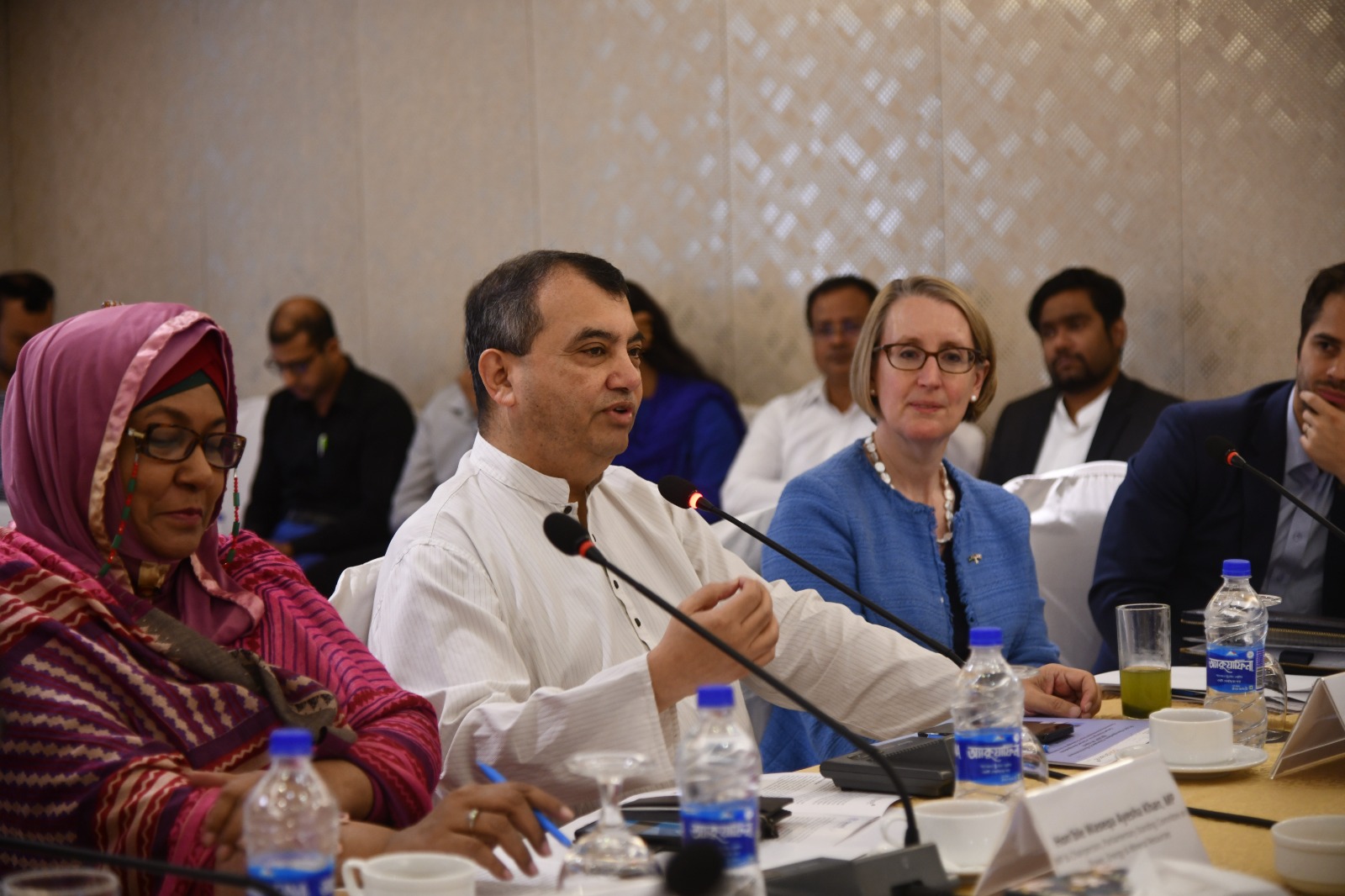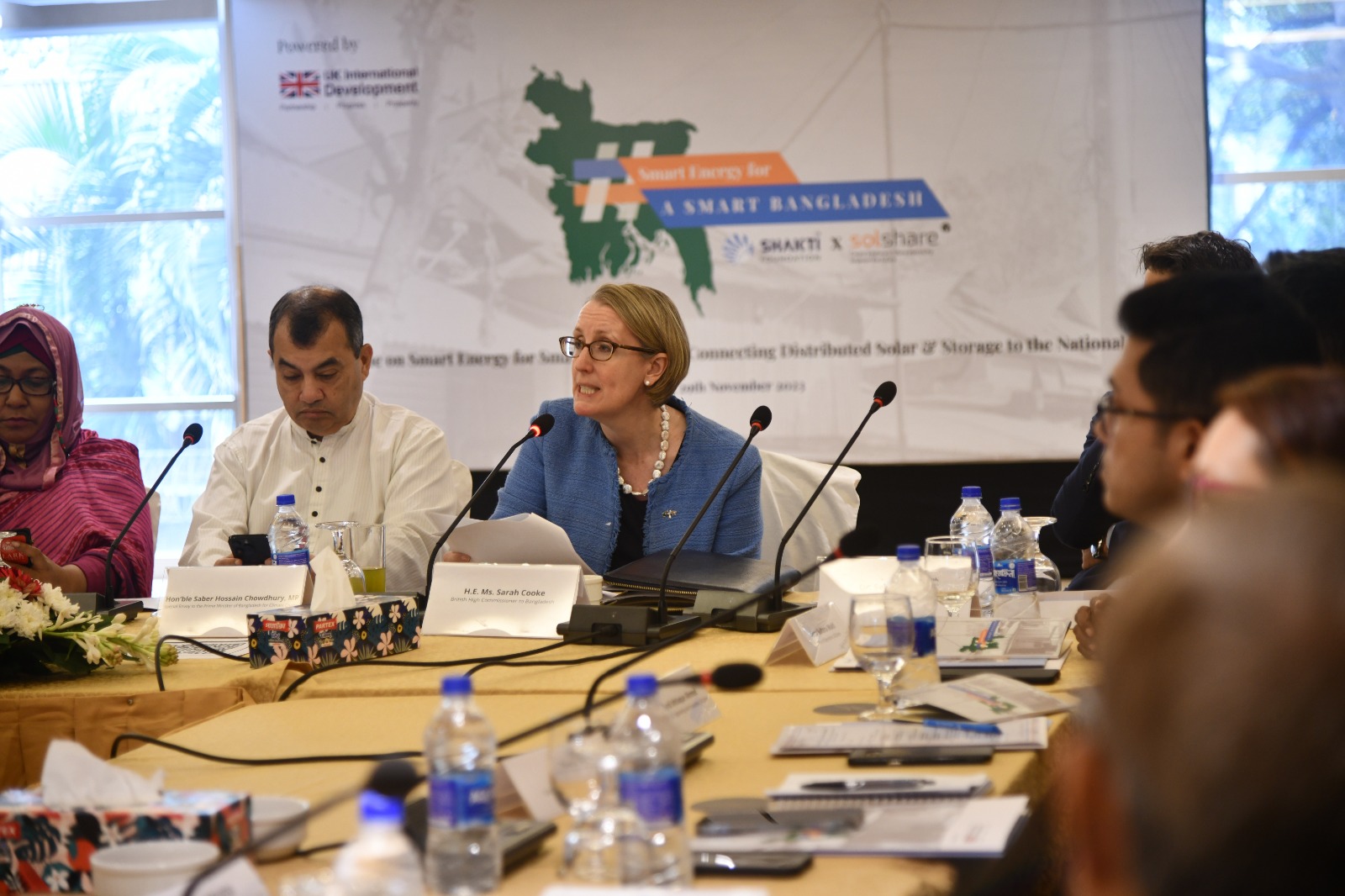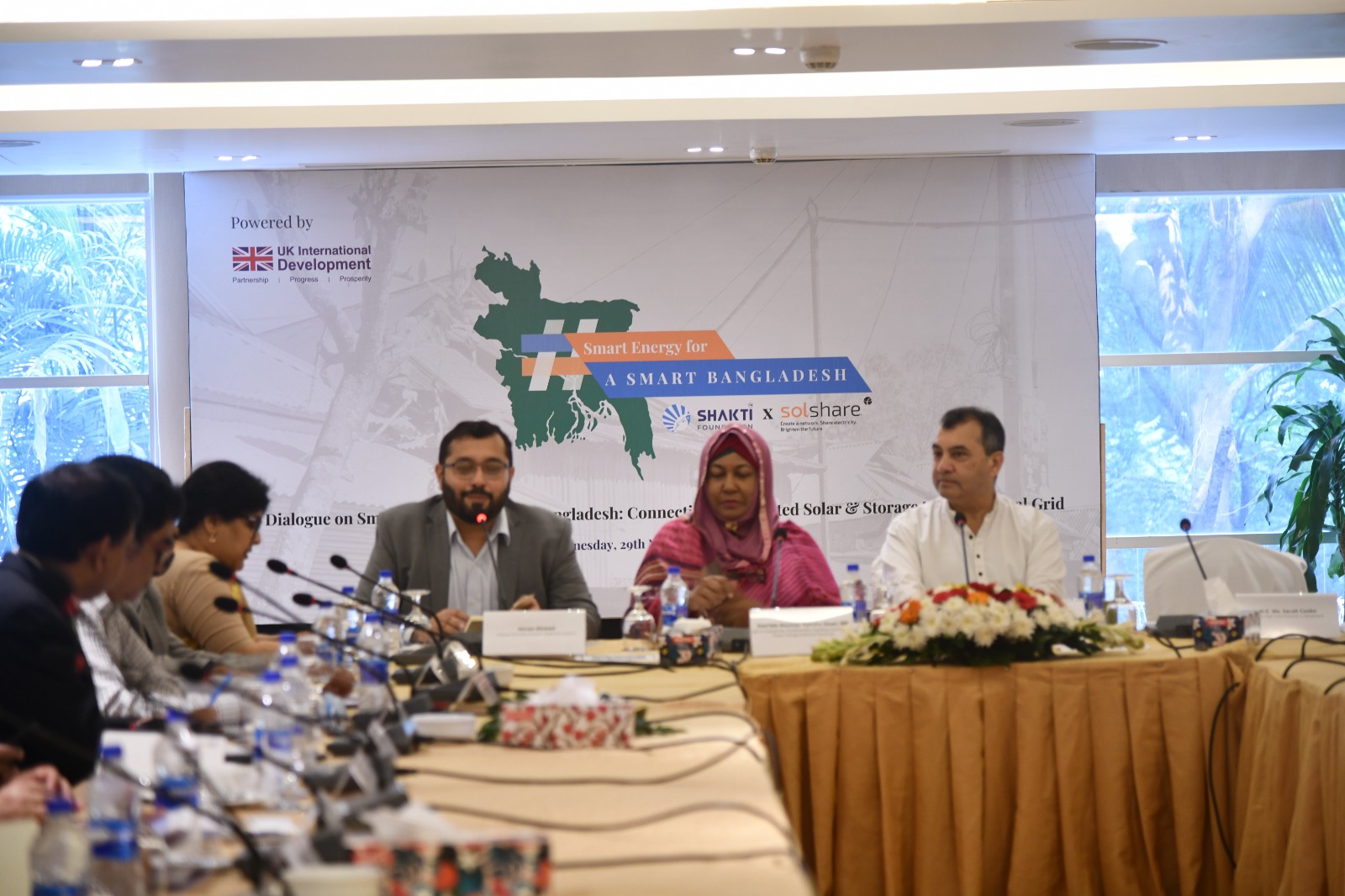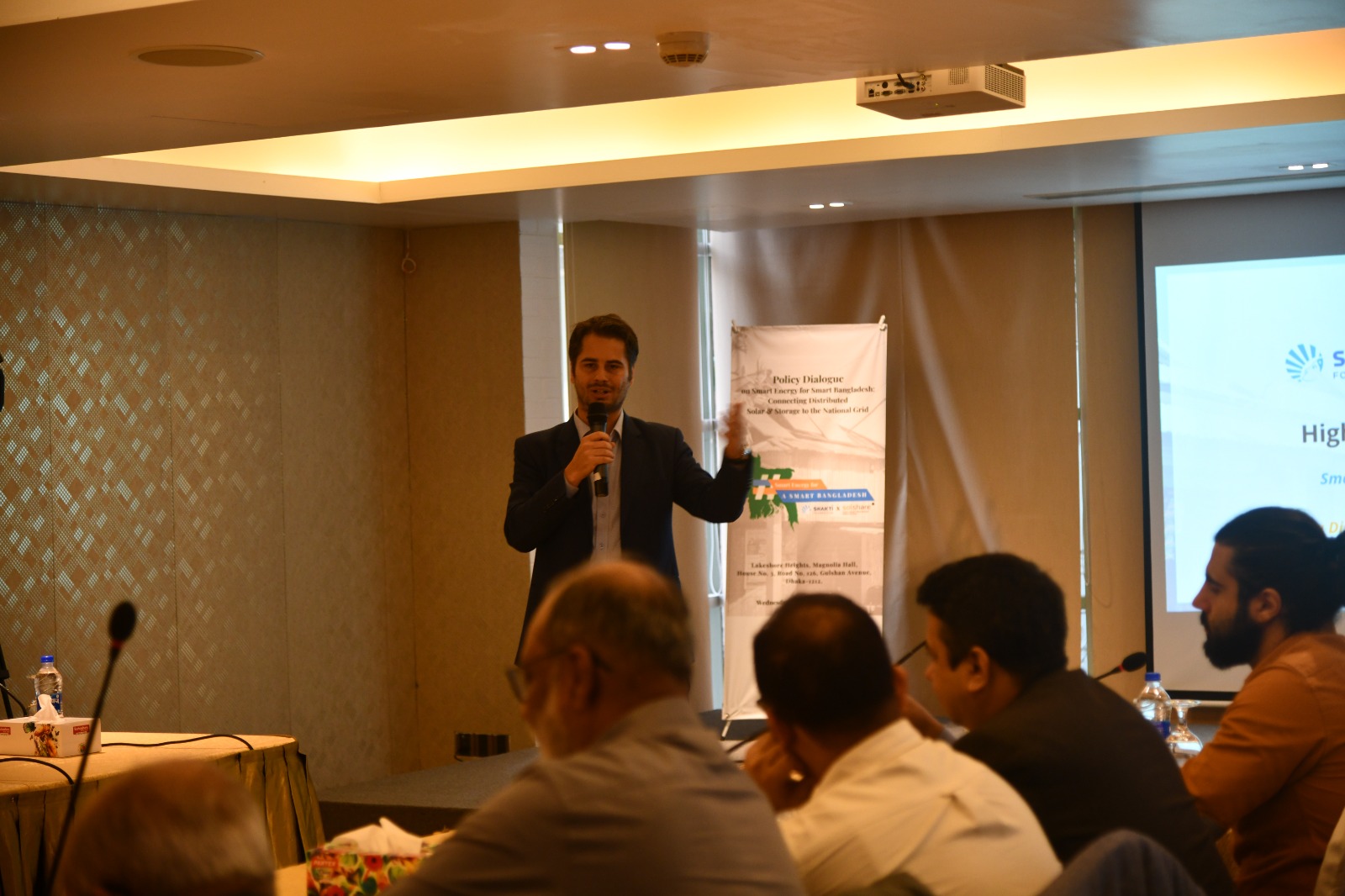The High-Level policy dialogue titled “Smart Energy for a Smart Bangladesh” is based on the FCDO-supported project jointly implemented by Shakti Foundation & SOLshare where solar sharing grids and electric three-wheeler charging points have been smartly interconnected with the national grid. The policy dialogue was held on Wednesday the 29th of November 2023 at 11am in Magnolia Hall of the Lakeshore Heights Hotel, just a day ahead of the start of the international climate summit COP28 in Dubai.
Special Envoy to the Prime Minister of Bangladesh for Climate Change, Hon’ble Mr. Saber Hossain Chowdhury, MP attended as the Chief Guest.

H.E. Sarah Cooke, British High Commissioner to Bangladesh attended the event as the Guest of Honor, as well as Hon’ble Ms. Waseqa Ayesha Khan, MP & Chairperson, Parliamentary Standing Committee on Power, Energy & Mineral Resources Division, MoPEMR. Imran Ahmed, Deputy Executive Director of Shakti Foundation and . Sebastian Groh, Co-Founder and Managing Director of SOLshare also present in the Policy Dialogue.
This project integrates two of Bangladesh’s major electrification systems: the national grid with the deployment of solar home systems (SHS) in a peer-to-peer (P2P) solar microgrid and an electric three-wheeler charging pitstop through a single point. The Point of Common Coupling (PCC) serves as the central connection for feeding renewable energy back to the national grid, extending the life of these systems, and supporting the country's Nationally Determined Contributions (NDC) targets to boost renewable energy in the energy mix.
The project showcases a sustainable approach for the six million solar home systems (SHSs) in Bangladesh with the potential of creating millions of green jobs. By integrating with the grid, it contributes to the national renewable energy targets and creates an extra income source for vulnerable communities. This initiative marks a global first, transforming a small farming community from passive consumers to proactive prosumers, co-powering the country.
Additionally, an electric three-wheeler (E3W) charging pitstop was installed allowing the community to successfully feed their excess solar electricity to when the national grid was unavailable. Through data monitoring it was observed that the grid was available about 53% of the time, resulting in excess energy with nowhere to go, of up to 40%. The partnership designed a creative solution to address it by installing an E3W charging pitstop. All the project activities were supported by FCDO and given regulatory approval in the form of a sandbox from BREB and SREDA.
The pitstop not only served as an outlet for excess electricity but also enabled the community to continue feeding surplus solar power during grid unavailability due to power outages or load shedding. This approach minimizes excess energy, maximizes solar generation capacity, enhances energy efficiency, reduces losses, and ensures additional income for the community.
Chief Guest, Hon’ble Mr. Saber Hossain Chowdhury, MP, and Special Envoy to the Prime Minister of Bangladesh for Climate Change, said “The most important policy adaptation that we need is bidirectionality for this innovation; being able to buy and sell excess solar electricity. I believe we need less of a fundamental change of policies and more of a modification of policies that would allow this energy transition to take place.”
Special Guest, British High Commissioner to Bangladesh H.E. Ms. Sarah Cooke said,”We have particularly supported this initiative around integrating solar into the national grid because the sooner the conversion to renewable energy happens, the more cost effective it will be and the quicker Bangladesh will be able to ensure energy security. We believe the project has made substantial achievemens in benefitting the consumers and in terms of reducing fossil fuel usage.”

Special Guest, Hon’ble Ms. Waseqa Ayesha Khan, MP & Chairperson, Parliamentary Standing Committee on Power, Energy & Mineral Resources Division said “This project is using existing assets (solar home systems and lithium batteries of electric three wheelers) to benefit rural communities and turn them into micro-entrepreneurs. It is a great initiative, and I am all for it. We just have to keep in mind proper recycling (of lithium batteries), waste management and that women in the community benefit from it.”.
“We did not know that solar power could be sold. Neither did we know that solar could charge electric three wheeler vehicles. We thank Shakti Foundation and SOLshare for enlightening us and creating ways of additional income for us”, said Md. Makbul , one of the community members from Saddam Bazar Mymensingh, who directly benefits from this project.
“Shakti is always looking for opportunities to create green jobs and entrepreneurs for sustainable socio-economic development, especially for marginalized communities. We were excited to implement this project as it presents a case to create so many by preventing the SHS from becoming redundant, while creating an additional source of income for them. If scaled up, this will also take us one step closer to increase the renewable energy mix as stipulated in Mujib Climate Prosperity Plan (MCPP) by 2041”, said Imran Ahmed, Deputy Executive Director of Shakti foundation.

“One third of Bangladesh's electricity generation capacity is from imported liquid fuels. The cost of power from this fuel is about US$ 0.18 per kWh. But these community-level micro-entrepreneurs are not asking for a green premium or higher prices, they are just at par, and they are not asking for dollars, but Bangladeshi Taka. They are not depleting our forex reserves while providing renewable energy backed by storage." commented Dr. Sebastian Groh, Co-Founder and Managing Director of SOLshare on promoting local green entrepreneurship.
